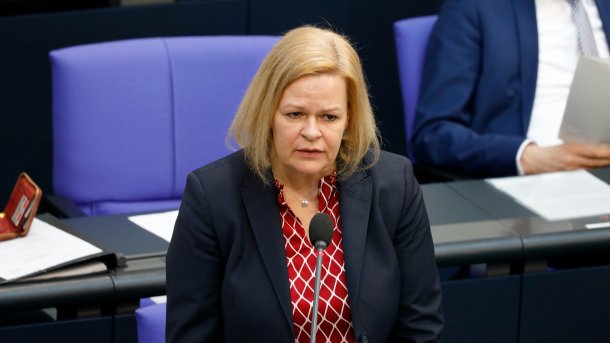Faeser calls for data retention after ECJ ruling
Following the HADOPI ruling, the Minister of the Interior sees the way clear for the storage of IP connection data.

(Bild: Juergen Nowak/Shutterstock.com)
Federal Minister of the Interior Nancy Faeser (SPD) sees her call for the reintroduction of data retention for IP addresses confirmed by a ruling of the European Court of Justice.
"The European Court of Justice has now ruled very clearly in the judgment of the full court of 27 judges that an obligation to store IP addresses to combat crime is not only expressly permissible, but also absolutely necessary," Faeser announced in a press release. However, on Wednesday, the European Court of Justice issued a landmark ruling on the proportionality and appropriateness of retaining internet protocol connection data.
The Minister of the Interior sees the wording of the ruling as support for her position. Among other things, it states: "Moreover, if such access were not permitted, there would be [...] a real risk of systemic impunity not only for criminal offenses in the form of copyright infringement or related rights, but also for other types of criminal offenses that are committed online or whose commission or preparation is facilitated by the characteristics of the internet." This could justify interference with fundamental rights under the EU Charter of Fundamental Rights if it is proportionate.
No more restriction to the most serious crimes
"The European Court of Justice is no longer sticking to the restriction to cases of serious crime such as the appalling sexualized violence against children," said the Home Secretary, expressing her delight. "These are significant innovations and milestones set by the highest EU court." The EU judges in Luxembourg had ruled in the case of serious copyright infringements.
Faeser is currently facing the problem that it was agreed in the coalition agreement to end the debate on the introduction of the Quick Freeze approach - and that Federal Chancellor Olaf Scholz and the Minister of Justice Marco Buschmann, who is responsible for Quick Freeze, recently agreed on its introduction without the involvement of the Minister of the Interior. The compromise: the current regulations on data retention were to remain suspended, but not formally removed from the law.
However, the currently inapplicable German regulations would be difficult to reconcile with yesterday's ECJ ruling: The judges in Luxembourg have defined extensive requirements as to how unauthorized profiling based on the data must be prevented and under what circumstances access may take place at all. Nevertheless, the debate about possible IP data retention in Germany is likely to be revived in the coming weeks - Federal Minister of Justice Marco Buschmann is then expected to present his revised Quick Freeze proposal, which could then become law. Hesse, where the CDU and SPD are in coalition, recently submitted a proposal for one-month data retention.
(mho)